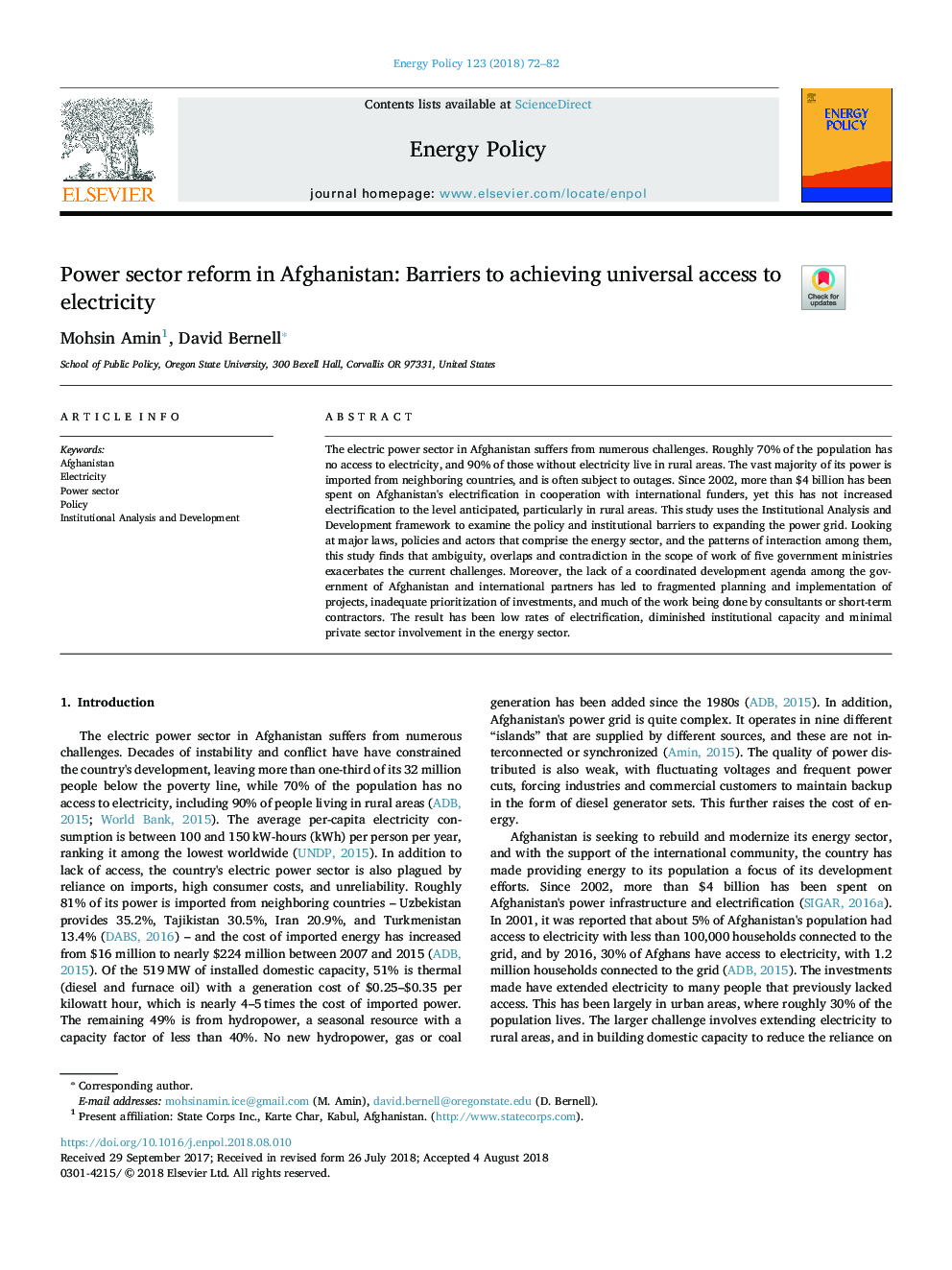| کد مقاله | کد نشریه | سال انتشار | مقاله انگلیسی | نسخه تمام متن |
|---|---|---|---|---|
| 8948042 | 1645633 | 2018 | 11 صفحه PDF | دانلود رایگان |
عنوان انگلیسی مقاله ISI
Power sector reform in Afghanistan: Barriers to achieving universal access to electricity
ترجمه فارسی عنوان
اصلاح بخش بخش برق در افغانستان: موانع دستیابی به دسترسی جهانی به برق
دانلود مقاله + سفارش ترجمه
دانلود مقاله ISI انگلیسی
رایگان برای ایرانیان
کلمات کلیدی
افغانستان، برق، بخش برق، سیاست، تجزیه و تحلیل و توسعه سازمانی،
ترجمه چکیده
بخش برق در افغانستان از چالش های متعددی رنج می برد. تقریبا 70 درصد از مردم دسترسی به برق ندارند و 90 درصد از افراد بدون برق در مناطق روستایی زندگی می کنند. اکثریت قریب به اتفاق از کشور های همسایه وارد می شود و اغلب به قطع برق مربوط می شود. از سال 2002 بیش از 4 میلیارد دلار برای مصارف برق افغانستان در همکاری با وجوه بین الملل صرف شده است، اما این افزایش برق را به سطح پیش بینی شده، به ویژه در مناطق روستایی افزایش نداده است. این مطالعه با استفاده از چارچوب تجزیه و تحلیل و توسعه نهاد برای بررسی خط مشی ها و موانع سازمانی برای گسترش شبکه برق. این مطالعه نشان می دهد که ابهام، همپوشانی و تناقض در محدوده کار پنج وزارتخانه های دولتی، با توجه به قوانین، سیاست ها و بازیگران که بخش انرژی را تشکیل می دهند و الگوهای تعامل آنها میان آنها، چالش های فعلی را تشدید می کند. علاوه بر این، فقدان دستور کار توسعه هماهنگ در میان حکومت افغانستان و شرکای بین المللی منجر به برنامه ریزی و اجرای مناسبی از پروژه ها، اولویت بندی نامناسب سرمایه گذاری ها و بسیاری از کارهای انجام شده توسط مشاوران یا پیمانکاران کوتاه مدت شده است. در نتیجه، میزان کم الکتریکی، ظرفیت نهادی کاهش یافته و کمترین دخالت بخش خصوصی در بخش انرژی بوده است.
موضوعات مرتبط
مهندسی و علوم پایه
مهندسی انرژی
مهندسی انرژی و فناوری های برق
چکیده انگلیسی
The electric power sector in Afghanistan suffers from numerous challenges. Roughly 70% of the population has no access to electricity, and 90% of those without electricity live in rural areas. The vast majority of its power is imported from neighboring countries, and is often subject to outages. Since 2002, more than $4 billion has been spent on Afghanistan's electrification in cooperation with international funders, yet this has not increased electrification to the level anticipated, particularly in rural areas. This study uses the Institutional Analysis and Development framework to examine the policy and institutional barriers to expanding the power grid. Looking at major laws, policies and actors that comprise the energy sector, and the patterns of interaction among them, this study finds that ambiguity, overlaps and contradiction in the scope of work of five government ministries exacerbates the current challenges. Moreover, the lack of a coordinated development agenda among the government of Afghanistan and international partners has led to fragmented planning and implementation of projects, inadequate prioritization of investments, and much of the work being done by consultants or short-term contractors. The result has been low rates of electrification, diminished institutional capacity and minimal private sector involvement in the energy sector.
ناشر
Database: Elsevier - ScienceDirect (ساینس دایرکت)
Journal: Energy Policy - Volume 123, December 2018, Pages 72-82
Journal: Energy Policy - Volume 123, December 2018, Pages 72-82
نویسندگان
Mohsin Amin, David Bernell,
